#rgu blogging
Explore tagged Tumblr posts
Text
In hindsight Mikage had soooo much audacity forcing all those people to delve into their inner psyche while being deeply in denial about being gay
#you all need to face and open up to your most scariest thoughts and feelings. not me though#I’ve been watching rgu after it’s been on my list for over a decade and I can feel it seeping into my subconscious#rgu blogging#mikage souji
28 notes
·
View notes
Text

i have nothing left
#rgu#revolutionary girl utena#utena#nanami kiryuu#my art#digital art#definitely not inspired by my nanami elevator shot analysis on my side blog teehee
2K notes
·
View notes
Text
Gendered pronouns in Japanese vs English
In Revolutionary Girl Utena, the main character Utena is a girl (it says so in the title), but very conspicuously uses the masculine first person pronoun 僕 (boku) and dresses in (a variation of) the boys school uniform. Utena's gender, and gender in general, is a core theme of the work. And yet, I haven’t seen a single translation or analysis post where anyone considers using anything other than she/her for Utena when speaking of her in English. This made me wonder: how does one’s choice of pronouns in Japanese correspond to what one’s preferred pronouns would be in English?

There are 3 main differences between gendered pronouns in Japanese vs English
Japanese pronouns are used to refer to yourself (first-person), while English pronouns are used to refer to others (third-person)
The Japanese pronoun you use will differ based on context
Japanese pronouns signify more than just gender
Let’s look at each of these differences in turn and how these differences might lead to a seeming incongruity between one’s Japanese pronoun choice and one’s English pronoun choice (such as the 僕 (boku) vs she/her discrepancy with Utena).
Part 1: First-person vs third-person
While Japanese does technically have gendered third person pronouns (彼、彼女) they are used infrequently¹ and have much less cultural importance placed on them than English third person pronouns. Therefore, I would argue that the cultural equivalent of the gender-signifying third-person pronoun in English is the Japanese first-person pronoun. Much like English “pronouns in bio”, Japanese first-person pronoun choice is considered an expression of identity.
Japanese pronouns are used exclusively to refer to yourself, and therefore a speaker can change the pronoun they’re using for themself on a whim, sometimes mid-conversation, without it being much of an incident. Meanwhile in English, Marquis Bey argues that “Pronouns are like tiny vessels of verification that others are picking up what you are putting down” (2021). By having others use them and externally verify the internal truth of one’s gender, English pronouns, I believe, are seen as more truthful, less frivolous, than Japanese pronouns. They are seen as signifying an objective truth of the referent’s gender; if not objective then at least socially agreed-upon, while Japanese pronouns only signify how the subject feels at this particular moment — purely subjective.
Part 2: Context dependent pronoun use
Japanese speakers often don’t use just one pronoun. As you can see in the below chart, a young man using 俺 (ore) among friends might use 私 (watashi) or 自分 (jibun) when speaking to a teacher. This complicates the idea that these pronouns are gendered, because their gendering depends heavily on context. A man using 私 (watashi) to a teacher is gender-conforming, a man using 私 (watashi) while drinking with friends is gender-non-conforming. Again, this reinforces the relative instability of Japanese pronoun choice, and distances it from gender.

Part 3: Signifying more than gender
English pronouns signify little besides the gender of the antecedent. Because of this, pronouns in English have come to be a shorthand for expressing one’s own gender experience - they reflect an internal gendered truth. However, Japanese pronoun choice doesn’t reflect an “internal truth” of gender. It can signify multiple aspects of your self - gender, sexuality, personality.
For example, 僕 (boku) is used by gay men to communicate that they are bottoms, contrasted with the use of 俺 (ore) by tops. 僕 (boku) may also be used by softer, academic men and boys (in casual contexts - note that many men use 僕 (boku) in more formal contexts) as a personality signifier - maybe to communicate something as simplistic as “I’m not the kind of guy who’s into sports.” 俺 (ore) could be used by a butch lesbian who still strongly identifies as a woman, in order to signify sexuality and an assertive personality. 私 (watashi) may be used by people of all genders to convey professionalism. The list goes on.
I believe this is what’s happening with Utena - she is signifying her rebellion against traditional feminine gender roles with her use of 僕 (boku), but as part of this rebellion, she necessarily must still be a girl. Rather than saying “girls don’t use boku, so I’m not a girl”, her pronoun choice is saying “your conception of femininity is bullshit, girls can use boku too”.

Through translation, gendered assumptions need to be made, sometimes about real people. Remember that he/they, she/her, they/them are purely English linguistic constructs, and don’t correspond directly to one’s gender, just as they don’t correspond directly to the Japanese pronouns one might use. Imagine a scenario where you are translating a news story about a Japanese genderqueer person. The most ethical way to determine what pronouns they would prefer would be to get in contact with them and ask them, right? But what if they don’t speak English? Are you going to have to teach them English, and the nuances of English pronoun choice, before you can translate the piece? That would be ridiculous! It’s simply not a viable option². So you must make a gendered assumption based on all the factors - their Japanese pronoun use (context dependent!), their clothing, the way they present their body, their speech patterns, etc.
If translation is about rewriting the text as if it were originally in the target language, you must also rewrite the gender of those people and characters in the translation. The question you must ask yourself is: How does their gender presentation, which has been tailored to a Japanese-language understanding of gender, correspond to an equivalent English-language understanding of gender? This is an incredibly fraught decision, but nonetheless a necessary one. It’s an unsatisfying dilemma, and one that poignantly exposes the fickle, unstable, culture-dependent nature of gender.

Notes and References
¹ Usually in Japanese, speakers use the person’s name directly to address someone in second or third person
² And has colonialist undertones as a solution if you ask me - “You need to pick English pronouns! You ought to understand your gender through our language!”
Bey, Marquis— 2021 Re: [No Subject]—On Nonbinary Gender
Rose divider taken from this post
#langblr#japanese#japanese language#language#language learning#linguistics#learning japanese#utena#revolutionary girl utena#shojo kakumei utena#rgu#sku#gender#transgender#nonbinary#trans#official blog post#translation#media analysis
3K notes
·
View notes
Text
I think it’s interesting in rgu how Utena’s aspiration of being a prince is not only hurtful to Anthy but also serves a sort of double purpose in Utena’s life wherein it allows her to express aspects of her gender expression and sexuality without having to really confront them directly, and a lot of the most important moments in her character arc are moments where she has to confront those things without relying on it.
Utena saying at the end that the only times she was really happy was when she was with Anthy is so important because it’s not just her presence that changes Anthy’s life but the reverse is true as well, and the idea that she is acting solely on some sort of heroic noble mission separate from her own feelings at times allows her to kind of sidestep the vulnerability of admitting that. It’s after Dios has urged her to give up, saying that she’s done all she could and giving her a way out and into complacency that would still leave her ego and dream of keeping her promise to Dios partially intact, but it wasn’t ever really her promise to Dios that mattered but her promise to Anthy both as a child and once she knows her that matters.
It’s also really interesting that the first time she says no to Akio she says it’s because she wants to stay true to her prince—it’s an idea that gives her a way to momentarily reject his advances without acknowledging that her own feelings should be reason enough, and shows how she feels that appealing to (even an abstract) patriarchal figure gives validity to her own feelings that they wouldn’t have on their own.
Episodes 12 and 37 are also really interesting in that they both begin when Utena has realized that she does not truly know or understand Anthy and feels betrayed by her, and she temporarily renounces her role of “protecting” her only to realize that her relationship with Anthy is deeply important to her personally even outside of that dynamic, as is her masculinity/gender expression, but in order to express this realization she ultimately returns to that dynamic (trying to protect Anthy via the dueling system) in both cases because she cannot yet imagine another way. It’s not until she fails at being a prince that she succeeds in expressing her true feelings and escaping the academy/the structure it represents (and inspiring Anthy to do the same) because those things were never truly compatible to begin with.
#I promise I will talk about things other than rgu on this blog at some point#I only have one season of Black Sails and IWTV left! and I will have lots of thoughts when I’m done#I just need to sit down and finish them#anyway I know all these themes in Utena have been rehashed a lot I just like talking about them so#rgu#revolutionary girl utena#mine
416 notes
·
View notes
Text
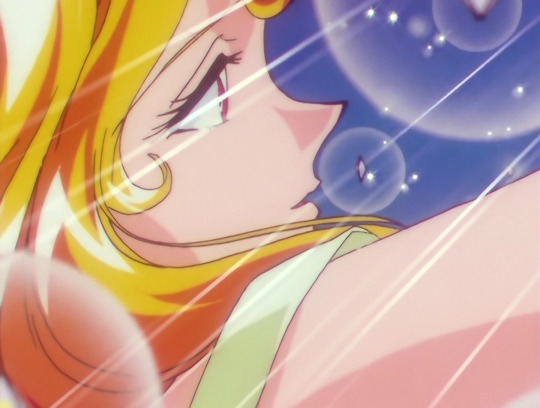


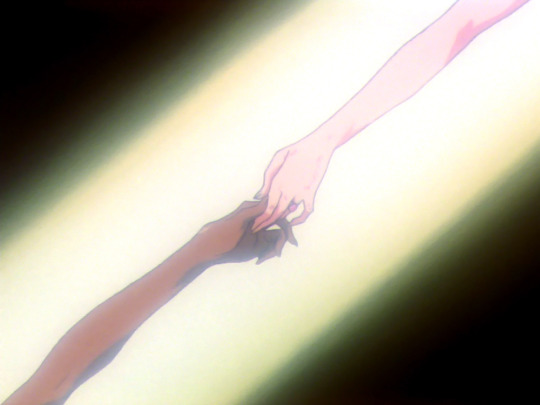
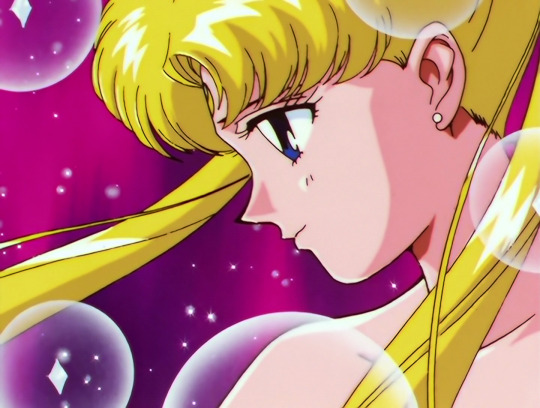
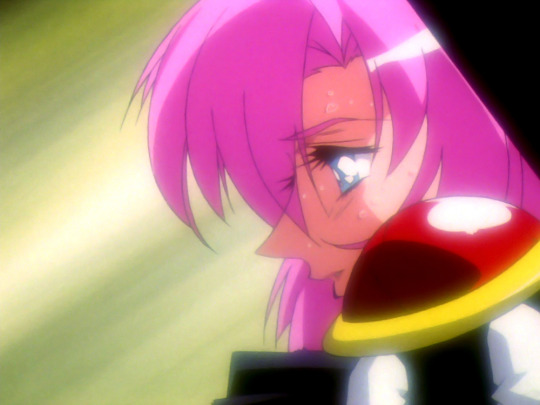
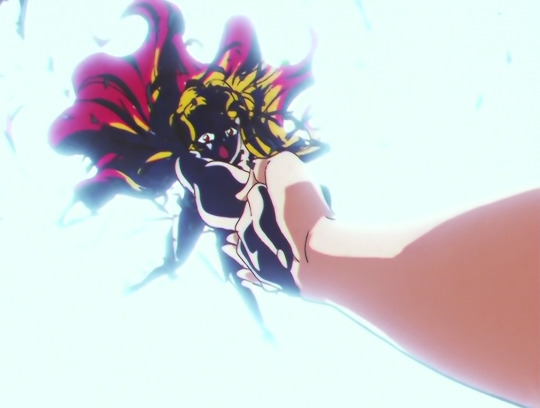
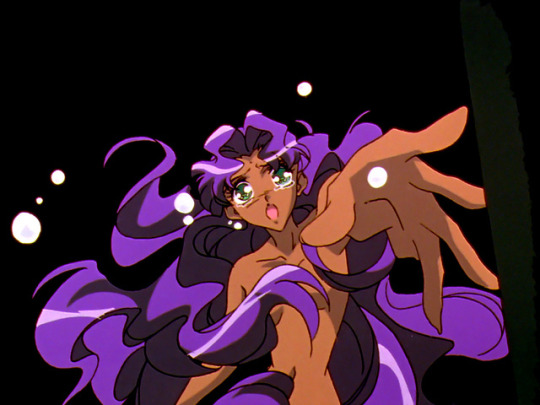
sailor moon episode 200 .. revolutionary girl utena episode 39
#rgu#sailor moon#sailor moon stars#sailor galaxia#anthy himemiya#utena tenjou#usagi tsukino#galaxia does not fall but anthy does- still decided to include the last pics though because they look similar#i know i'm not breaking new ground or anything with this one btw. i just wanted to line them up nicely. this blog is my scrapbook#(and sorry if someone made this exact post at some point and i just couldnt find it in the few minutes i spent checking lol)#interesting i and i assume others heavily associate this sequence with utena but sm did it first#maybe someone else did it even more first. feel free to reply and tell me#it's been posted already so i won't post it here but the rgu homage in cosmos did kinda inspire me to make this post bc its like#90s sailor moon inspired utena which then inspired cosmos... swag. very Cyclical of you. endlessly meta
292 notes
·
View notes
Text

Revolutionary Girl Utena Chiho Saito Luxury Illustrations (archive.org)
222 notes
·
View notes
Text
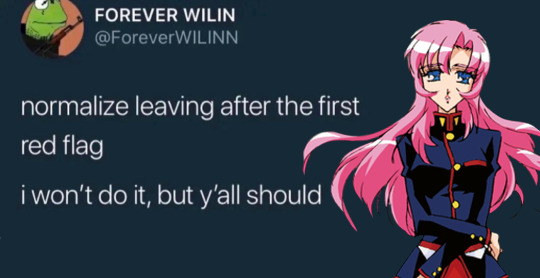






Shout outs to Wakaba for being the only brown eyed character frfr
#i haven't made much rgu content in a while eithere here or on my art blog#a shame#rgu#revolutionary girl utena#sku#shoujo kakumei utena#wakaba shinohara#utena tenjou#anthy himemiya#akio ohtori#mikage souji#mamiya chida#touga kiryuu#juri arisugawa#↪ posts
2K notes
·
View notes
Text
I just find Wakaba really fascinating in the terms of how the narrative evolves around her. She stays the same while everything around her changes, she wants to become special and important to the story and then...never gets that. She gets into the car with Akio but we don't see Anything. She's not important enough to be given that spotlight, or to see how that could have affected her. She seems surface level happy and then that's it. We don't get to know because the narrative is completely uninterested in her emotional and personal development and character.
She gets the one episode, goes back to how it was before, and then doesn't appear much in that later half even though she was important in the Student Council Arc for Utena's personal development. And even that you can view that as her acting only in service to the main characters. After that and Black Rose she appears mainly to push Utena further into the sexist nightmare of Othori Academy.
And then she forgets everything.
The most change happening to her afterwards is her repeating Utena's role. She does not get a role of her own because she's the understudy to Utena's role. The narrative is a leering man that has no interest in her as a person but also doesn't want her to leave it's sight. Horrifying. 10/10. Wakaba I love you.
#rgu#metaposting#I wrote this suddenly and then accidentally posted it on the wrong blog whoops#wakaba shinohara#I just woke up so this is a bit messy
97 notes
·
View notes
Text
Some lyrics that made me think of them, I hope someone else understands what I mean





#souji mikage#mamiya#mamiya chida#mikage souji#utena#rgu#revolutionary girl utena#momus#faunlet#boy blog#boyblog#faunlet community#faunlet aesthetic#boy blogger#boycore#boyhood#teenagehood#tumblrboy#tumblr boy#lyrics#song lyrics#Spotify#anime#manga
38 notes
·
View notes
Text



















The Choice by Nikolay Gumilev (transl. by Evgenia Sarkisyants) // The Terror, 2018
#the terror#nikolay gumilev#web weave#remaking this post on my new blog because back then i was an idiot and didn't know you could add more than 10 images on pc#not that anyone asked for it i just miss this post sometimes lol#my edits#poetry#it's just one of my favourites in russian#apparently my fandom niche is subjecting everyone to random russian poems#like that akhmatova rgu edit
78 notes
·
View notes
Text
Okay, so I accidentally thought about Stage Productions of Dr. Horrible Where There’s Not Enough Male Actors So Billy is Played By a Woman too hard again. And the thing is, well, I say ‘Stage Productions of Dr. Horrible Where There’s Not Enough Male Actors So Billy is Played By a Woman’ and not, like, ‘Female!Billy Productions’ because in all of the ones I’ve seen the script is unchanged and so the character is still textually a man. Super-minor characters like the Mayor and the two Newscasters or even Bad Horse can sometimes get genderswapped, but usually the kind of people dedicated enough to DHSAB to want to create their own recreation of it don’t want to change the script too much. So Billy remains gendered the same way he is in the original.
But also… Dr. Horrible isn’t gendered that much in the text of the script. Like, he gets talked about in third-person way less often than the other two leads (so there’s less places where he would be called he/him/himself), he’s not referred to using gendered terms as often as the two other leads, ‘Billy’ can work as a gender-neutral name and ‘Dr. Horrible’ is 100% gender-neutral. As such, the only textual references to Dr. Horrible being a dude are:
Refers to himself as a guy in ‘My Freeze Ray’: ‘I’m the guy who makes it real/the feelings you don’t dare to feel’
Refers to himself as a man in the title line of ‘A Man’s Gotta Do’
Moist calls him a man in the line ‘look at me, Man, I’m Moist!’
Refers to himself as a guy in ‘Brand New Day’, ‘Go ahead and laugh/Yeah I’m a funny guy!’
The one time Dr. Horrible is called by a third person pronoun is during ‘So They Say’, when Moist notes that ‘he’s still not picking up’
During ‘Everything You Ever’, he sings ‘My victory’s complete/so hail to the king’. Implicitly calling himself a ‘king’.
So, like, what that means is that if a production did just want to genderswap Billy… it’ll be considerably easier than doing it with either of the other two leads. There’s basically just a few lines you have to change and basically nothing else.
Like, ‘I’m the gal who makes it real’ is really a no-brainer. ‘a man’s gotta do what a man’s gotta do’ is an Idiom and I could see a woman quoting it without it meaning anything. (And in a pinch you can replace it with the gender-neutral ‘one’s gotta do what one’s gotta do' or maybe 'I've gotta do what I've gotta do').
“He’s still not picking up” often gets cut from stage reworks of ‘So They Say’ anyways or swapped for something like ‘Doc’s still not picking up’ to make it clear who’s Moist talking to without the Magic the Kuleshov Effect Really. The only line that offers any meaningful challenge is in ‘Brand New Day’ and 'Everything You Ever' cause that use of ‘guy’ and 'king' is part of a rhyme, but I still feel like it’s not the toughest one to solve.

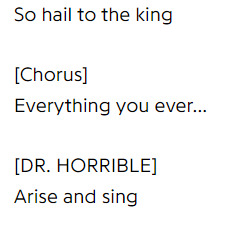
… of course, I keep saying the three main characters because Moist isn’t actually gendered once in the entire script. So basically every time a production gets a girl to play Moist that Moist has a Gender Quantum Position.
But, with all due respect to Moist and their Quantum Gender, that’s just not a change I find as interesting as the possibility of a Female Billy. Like, hey! We’ve got a second female character who is not primarily defined through her romantic relationships and survives through the end of the narrative and has a kind of a Gross Power you don’t really see for a female super-character, that’s… kinda neat. But I don’t really think there’s anything in here that really shakes the basic thematic undercurrents of the movie the way Female Billy does. Female Billy has a really the highest rate of Implied Changes to the Meaning of the Text Caused by the Change Vs. Actual Changes Required to the Text
Because, okay, look… Would making Dr. Horrible a woman fix every single thematic problem people have with the DHSAB Narrative forever and ever and make it the Politically Perfect-est Musical Ever? Nah. Does it arguably create its own set of problems with the whole Tragic Toxic Lesbian Trope? Yeah…
But that’s why I’m advocating for it not as some sort of Remake that’s gonna be the New Definitive Version That Fixes Everything, but as a stage production. A new version that exists in the Kaleidoscopic Multiverse of takes that the stage inherently creates. Not Ultimate, not Definitive, not ‘The’ version. Just A Version I think should exist. Because even if it’s not a change that’ll Fix Everything, it’s still gonna change things in a way I, personally, find very Compelling.
And I was thinking, as part of this train of thought, that if I were to do Lesbian Billy, that for Penny’s role, I would try and cast a girl with a very butch and/or nonconformist haircut. Cause, like, at the start, the one line Billy wants to tell Penny is

And that way you can connect it with how nonconformist hairstyles are used as a way to communicate queerness to other queer people with some plausible deniability from Mainstream Society. So it’s not just that it helps explain ‘oh, that’s why Billy even assumes her attraction could be mutual’, wanting to tell Penny that she loves her hair is a whole thing of

Or rather, because it’s Billy, more like
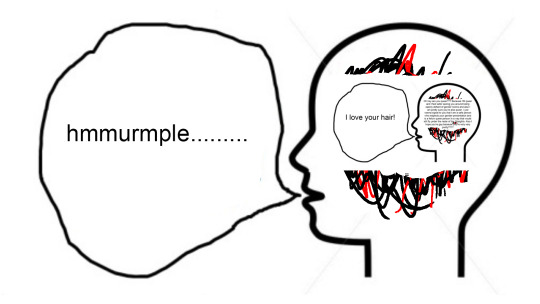
So that’s another layer of Added Thematic Meaning just via casting choices, without changing anything about the exact text of the script!
And, you know, charity, compassion and kindness are not Exclusively Feminine Traits. Penny could be kinda gender-nonconformist while also being innocent and maybe a bit naive. And, y’know, she’s a damsel in distress when compared to the characters who have super-strength and super-science at their disposal.
And then I thought, well, maybe we can also show Penny dressing more feminine during her time dating Captain Hammer, so there’s kind of an unspoken implication to the audience that maybe CH is pressuring her into being more gender-conformiming. Which isn’t just a New Way in Which Captain Hammer is terrible, it also connects with how he, as a superhero, functions as an upholder of the status que that Billy is trying to upends (and again, it makes ‘love your hair!’ an actually Really Important Line! It’s Billy showing that, even if her attraction right now is kinda shallow. She is appreciating something about Penny that is her choice and CH is probably trying to take away from her.)
And, like, even in readings of the DHSAB narrative that try and make it as critical of Billy as possible, you always kind hit a snug that there is also an unspoken but present assumption, that while Billy does kinda suck, he could’ve been a good romantic partner to Penny if he just Got Over His Shit and is still always better than Captain Hammer despite… not really doing a good job establishing why.
So this thread does give at least one clear reason for why Captain Hammer is absolutely worse for Penny than Billy is, without necessarily letting Billy off the hook for all the way she does still kinda Suck.
You know, since we’re talking about changing as little of the actual dialogue as possible, the audience might not be able to tell if Penny is an out-and-proud Bi woman and Captain Hammer is pressuring her to be less Obviously Queer or if she still hasn’t fully processed that her affinity towards gender-nonconformity is also somewhat connected to her sexuality and the whole debacle is her shoving herself deeper into the closet… but I think that if the audience notice Penny suddenly changing into girlier clothing after she starts getting close to Captain Hammer that’ll be enough to create a visceral “Oh, this guy is BAD” reaction of sort.
Plus, like, the way the narrative kinda treats Penny slowly sobering up to Captain Hammer’s bullshit and realizing she’s not actually in love with him
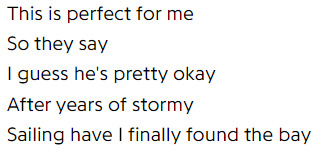
is treated as interchangeable with the process of her gradually falling in love with Billy

that would hit as less Weird, at least thematically, if we have that thread of Captain Hammer representing, like, Heteronormativity and the Patriarchy Billy and Penny both being girls....
And that’s when I came to realization

of what I was actually doing.
#dr. horrible's sing along blog#dr. horrible#musicals#doctor horrible#dr horrible#dr horribles sing along blog#revolutionary girl utena#utena#shoujo kakumei utena#utena tenjou#sku#anthy#rgu#musical#musical theatre#musical theater#theater#theatre#adaptation#anthy himemiya#rgu anthy#akio#akio ohtori
71 notes
·
View notes
Text
Peeps be like "This is my favorite movie" and it's Adolescence of Utena
#adolescence of utena#revolutionary girl utena#utena tenjou#anthy himemiya#meme#anime#movie#rgu#peeps is obviously me#it is a mandatory course watch if you are on my blog tbh ✨️🦋
156 notes
·
View notes
Text
Fansub Release + Analysis of Utena Ep 14
This is a big one!!

My fansub release posts aren't usually like this, but this episode is so jam packed with stuff I want to talk about that I had to write my translation notes as a series of essays. It's longer than usual so strap in!
First, a word on “The Mikage Seminar”
I’ve always found the translation “the Mikage Seminar” very strange. In English, a seminar is an event — a lecture. Yet “the Mikage Seminar” is discussed as though it’s not a recurring lecture, but a society or a school of therapy, or a cult (like scientology). In fact I did a bit of reading about scientology to try and find an alternative translation, and discovered that the origins of scientology, namely a set of ideas and practices called Dianetics, bears a lot of similarities to “the Mikage Seminar”. Both involve a type of therapy where one person looks into their mind and talks to an “auditor”.
The auditor coaxes the preclear to recall as much as possible. — Wikipedia
This in particular stood out to me! Mikage often says 「深く。もっと深く」 during his interviews (”Deeper. Dig deeper.”).
The Japanese word ゼミナール doesn’t actually come from the English “seminar” but the German “Seminar” (capitalised). According to Wikipedia, in Germany, and often in Japan, Seminar/ゼミナール is used to refer to a university course that includes a thesis project. So ゼミナール refers to a course of learning, rather than a talk or lecture. And it would make a lot of sense to call a system like Dianetics a “course”. Almost like a “course” of medicine — a “course” of psychological practices that you can join but never complete.
So it would make sense to translate it as “the Mikage Course”. But “course” has more meanings in English than just this, and in the context of a university this makes it sound more like a mundane teaching course. So I tried some other words: the Mikage Sessions, the Mikage Method, Mikage Psychotherapy, Mikage Therapy, the Mikage Movement. None seemed quite right. Until I remembered this post. ゼミナール is a foreign word in Japanese, why not find a foreign word for the translation? And so I settled on this:
The Mikage Seminarium, AKA The Society of the Black Rose…
Seminarium is Latin, and is where both the German and English derive seminar from. Its original meaning is “seed plot”, but it’s also just the Polish word for seminar. I really like how the Latin makes its meaning ambiguous — it kind of sounds like a location, kind of sounds like a society, and kind of sounds like a learning course. Because it is all of these things.


Anthy: では、香苗さん。失礼します。 Kanae: ね、あたしの事、お姉さんって呼んでいいのよ。もうすぐわたしはあなたの本当のお姉さんになるんだから。
A more literal translation:
Anthy: Thank you for having us, Kanae-san. Kanae: Please… you can just call me “sister”. I’m going to be your real sister soon enough anyway.
The translation I ended up going with:
Anthy: Thank you for having us, Miss Ohtori. Kanae: Please... you can just call me Kanae. We're going to be family soon. There's no need for the formalities.
Japanese honorifics strike again!
In English, sisters-in-law don’t ask to be called “sister”. That would be super weird in most scenarios, and this scene is trying to evoke a particular familiar feeling of closing a distance gap in a relationship. The audience is meant to relate. Changing how Anthy addresses Kanae was pivotal to this scene working properly.


わかりました。あなたは世界を革命するしかないでしょ。
I understand. Your only choice is to force the world to change around you.
This line is translated as “Your only choice is to revolutionise the world” by basically every other translation. The reason is clear — the Japanese is the same as when Utena pulls the sword out of Anthy, or when any of the other characters talk about “revolutionising the world”. However, in this context, I don’t like it. The nuance of the English phrase is quite different to the Japanese phrase. In English, it’s often used to describe new commercial products: “This new device will revolutionise the world!” It comes with an implied “for the better”, but has used to describe technological developments so unexciting that it can also feel hollow. When the student council talk of revolutionising the world, they sound like revolutionaries — the context makes it work. But in this context, it comes out of nowhere and doesn’t have any of that fervour, which makes it sound hollow and flaccid when it should sound sinister and manipulative.
I think a pervading throughline for all the Black Rose duelists is that they see their problems as caused by other people, with themselves being blameless. Rather than change how they approach their situation, Mikage tells them they’re in the right.
Your behaviour will set you down a path. If that path leads to your goals, well done! However, if your path does not lead to your goals, there’s only two ways you can achieve them.

The first is to change your behaviour so that it does align with your goals. The second, impossible way, is for the rest of the world to change such that your current path DOES end up leading to your goals. This second way is not possible in the real world. But it is possible in Utena.

Also I’ll just leave this here: “around you” → “revolve” → “revolution” 👀
Kanae tried to build a relationship with Anthy in a passive, non-confrontational, extremely Japanese way — the way she has been taught to behave, the “proper” way, a mechanical following of the social scripts. We don’t see a lot of their relationship, but the way she behaved and spoke of behaving towards Anthy is very very similar to the way my Japanese grandmother has behaved towards my and my brother’s partners.
It was unthinkable to her to change this pattern of behaviour. Her only choice was to change Anthy, change the rest of the world, so that her behaviour would lead to the outcomes she wants. You could describe this forceful bending of reality to be “revolutionising the world”.


この黒薔薇のある限り、私はこれから嘘の私を演じなくて住む。
As long as I have this Black Rose, I'm free from the lie I was living before.
Besides gender, growing up, and resisting change (which exist as separate themes but also all intertwine as one), another major theme present in Utena is the self and subjective reality. The self is explored within those first major three themes, but also in terms of how the self dictates reality with the Black Rose duellists.
Black Rose Kanae says that her past self was a lie.
It reminds me of all the times when I’ve been going through a personal trial and I’ve looked back on my past self and thought “How naive I was. I understand things better now.” And then after a while I realise I was wrong, and my first self was more right. And then later still, maybe I re-realise that the second self was more right! And so on! The reality of truth (or to use Kanae’s language, “lies”) is so subjective.
Who dictates knowledge production? Who decides what is true; what is valid knowledge? This is a question of sociology - and at the moment that answer is "science does, kinda". But science and academic systems are supported by capitalist structures and tainted by capitalistic incentives — needing to be published in a journal, issues of replicability, the barrier to entry into academia in the first place, etc, etc. In the future we may find our current way of organising knowledge to be archaic and primitive in the same way we look back at medieval scholars.
But what about organising self-knowledge? Knowledge where the only one who can really decide what is true is yourself. And the only one that can decide what yourself even IS is yourself. I feel like I have looked back on my old ways of conceptualising myself many times (not even counting the gender-based revelations) and thought it primitive and archaic, and NOW I truly understand who I am and how to think of myself and how my thoughts interact with my other thoughts. But I have no doubt that I’ll look back on this current self of mine and reject their way of thinking too.
After their heart is replaced by the Black Rose, the duellists themselves frame this change as a moment of self realisation, of clarity. Once the rose is inside them, they wake up from themselves, like I have countless times. Kanae says herself, “This is the true me.” Honestly, I don’t doubt it. I think that version of Kanae was her true self at that moment, given the things influencing her. Being brainwashed doesn’t make you less of a person, or less yourself. It just makes you organise your reality differently.


心を凍結させて作っただけの間に合わせのデュエリストでは、彼女は破れないな。
We won't be able to defeat her by simply freezing someone's heart and forcing them to duel.
Anya and I discussed this in depth. I originally translated 心 as “mind”, because that was the first thing that popped into my head and I thought that was the simple part of the translation. However, Anya pointed out that it didn’t make sense with the themes of self and subjective reality, and I strongly agreed, so I changed it to “heart” instead.
Anya suggested “conscious mind” instead of “heart” but I think heart is more accurate. 心 (kokoro) can mean heart or mind in Japanese (I find it interesting that those two things are portrayed as opposites in English), and that kanji is found in the word for biological heart, 心臓 (shinzou). When they say of the Black Rose "This is your new heart" they use 心臓. They also say "Your new 命 (life/lifeforce)" which I translated as soul since it sounded more hardcore and because "your new life" is a set phrase in English meaning a new chapter in your life rather than your life force. I think the idea is that they're freezing the duellists' ability to love and feel empathy, which in my opinion is necessary for them to commit to the unbelievably selfish act of revolutionising/reconstructing/bending the entire structure of the world for their own convenience.

A very special thanks to @dontbe-lasanya for being there to talk through all these themes and ideas. I'm incredibly proud of this episode's translation and I wouldn't have been able to do it without them.
If you want to see more analysis like this, let me know! And also follow this blog to see episodes of the fansub as they're released. You can find all episodes released so far here:
Rose divider taken from this post
#revolutionary girl utena#rgu#shoujo kakumei utena#sku#utena#media analysis#utena analysis#translation#japanese#japanese language#langblr#official blog post#utena fansub
166 notes
·
View notes
Text
The Girl That Drowned


The Boy That Tried To Save Her


The Prince's Disappearance


#i had this queued on my other blog but it got nuked#there was another thing too but i cant remember what it is#utena#rgu#revolutionary girl utena#adolescence of utena
327 notes
·
View notes
Text
My Favorite Character from each of my Favorite Anime
Hi! I’ve done a few separate posts about my top 10 anime and my favorite anime characters, but I decided I’d combine those ideas into one post and try and pick out my favorite character from each of my favorite anime. This is going to be hard because I know I have multiple favorites for most of these, but I will do my best. Let’s go!
Fullmetal Alchemist: Brotherhood- Hohenheim

I usually cycle between Ed, Hohenheim, and Mustang being my favorite character, but recently it’s been Hohenheim. I think he’s both under appreciated and misunderstood by the FMAB fandom. Long story short, I love characters riddled with guilt (not sure what this says about me lol). If you’re interested, I’ve already written a whole post about how much I love him!
Revolutionary Girl Utena- Utena

I always shift between Utena and Anthy being my favorite, but I really have loved Utena from the start. I find it very compelling how she hides her internal anguish behind her cheerful, positive persona.
Toradora- Taiga

I’ve already written so much about Taiga (in this post, spoilers) so there’s not much else to say besides that I’m the number 1 Taiga defender. I love her, she reminds me of myself in some ways, she’s great. I think she’s the perfect example of a ‘flawed’ protagonist.
Chihayafuru- Chihaya

Chihaya is such a ray of sunshine, comic relief, and a total fuck up, and yet she is an incredible karuta prodigy and the protagonist of the show. She is also one of the most realistic neurodivergent-coded characters I’ve ever seen. I think it’s fun how she defies expectations as well; she has the appearance of a beautiful cool model, but as soon as other characters talk to her they realize how much of a nerd she is.
March Comes in like a Lion- Hina

There are a lot of sub-plots and semi-important characters in this show, but the side character that I was always the most interested in was Hina. I think the way she is so open about her emotions is inspiring, and as she goes through hardships it’s nice to see how she matures while also maintaining her cheerful attitude.
Your Lie in April- Tsubaki

I haven’t watched this anime in a long time, but I do know that when I first watched it my favorite character was Tsubaki for sure. Her unrequited love plot line was heart wrenching and compelling.
Love is War- Ishigami

I also cycle between a few favorite characters in Love is War (I adore both Shirogane and Kaguya of course) but at this point in the story in the anime, Ishigami is my favorite. I think he is such a realistic portrayal of an insecure, awkward teen, and I love how noble and selfless he is behind the scenes.
Haikyuu- Kageyama

What else is there to say, truly? I loved Kageyama the second he was introduced. His dynamic with Hinata is what makes the show, and his stubborn, cold personality is something I tend to be drawn to when it comes to my favorite kinds of characters.
Madoka Magica- Homura

Sayaka is a really really close second, but after finishing the series for the first time I couldn’t get Homura’s story out of my head. Her determination and willpower are honestly unmatched, and each new watch of the show makes me appreciate her more.
Monster- Dieter

I feel like Dieter may seem like an odd choice for a favorite; as you may expect, Tenma (many people’s favorite I’d assume) is probably a close second for me. But I think I liked Dieter so much because he was proof that love and support are capable of saving even the most traumatized individual. He was so cute and I loved how much he loved Tenma.
If you made it through this whole thing, thanks for reading! Also, I highly recommend watching all of these, I’ve linked my spoiler free reviews in the titles if you haven’t watched them and are interested in finding out more.
Thanks for reading!
-threecheersforinking
#anime#anime review blog#anime review#favorite anime#favorites#naoki urasawa's monster#madoka magica#pmmm#haikyuu!!#haikyuu#love is war#kaguya sama love is war#your lie in april#March Comes in Like a Lion#sangatsu no lion#Chihayafuru#toradora#RGU#revolutionary girl utena#my favorite characters#fmab#fullmetal alchemist brotherhood
24 notes
·
View notes
Text
I cannot believe I have to write a post about this in regards to my Utena art, but an account on here called @/familyromantic just reblogged fanart I made of Miki and Kozue as ship art, and they are specifically a blog dedicated to incestuous ships and proshipping.
Of ALL of the art you could reblog of this topic, you choose to reblog non-ship art I made of two CHILDREN who have a deeply troubled and traumatizing relationship with incest in the context of their story, and tag my art as a ship on your blog.
Just to say this explicitly - any proshippers/incest shippers/sexual assault romanticizers/whatever: DO NOT REBLOG MY ART. Especially do not reblog my Utena art. I have already blocked this account so hopefully they won't be able to reblog any more of my Utena pieces, but I felt the need to make this post to establish firmly how I feel about this subject matter. Utena is a very triggering show that includes these topics, and that is unavoidable - what I won't tolerate is anyone who romanticizes and sexualizes these topics to engage with my fanart of the series.
#revolutionary girl utena#rgu#this is not a call out post#im sure theyve already had their fair share of people who are deeply disturbed or triggered by their blog#i do not care to engage with them i only want to block#just as a rule of thumb: please dont tag any art i make that i don't already tag as ship art AS ship art#obv this is a different scenario then say me just drawing a couple of friends i dont personally ship but#idk seeing that reblog notification was just like what the fuck to me#text post
26 notes
·
View notes